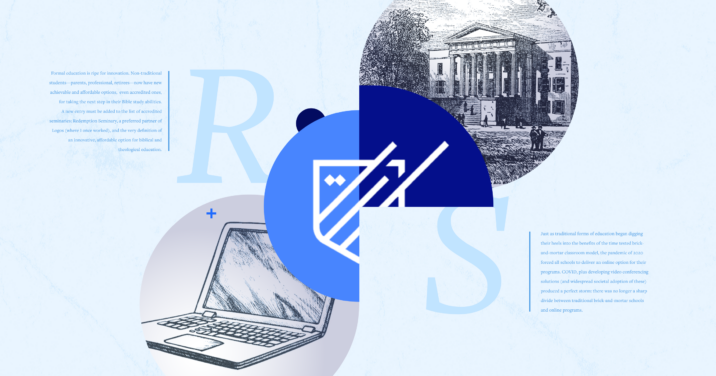Formal education is ripe for innovation. Non-traditional students—parents, professionals, retirees—have new options that are achievable, affordable, and accredited for advancing their Bible study abilities.
Tradition and attempted innovation
For centuries the traditional university classroom model remained unchanged. The ivory tower was built upon a monastic paradigm in which students would leave their hometown and cloister themselves away at a center of learning—along with its rare and expensive collection of knowledge, its library.
In the modern era, we layered on an industrial mindset: we treated students like raw materials to be formed into standardized products. The focus was on the teacher and the quality of the curriculum rather than on the gifting and learning of the student.
However, a storm of innovation began to threaten these still waters in the 1980s when video recordings promised economies of scale and accessibility using recorded class lectures. This technology resulted in much fervor—but only minor tweaks to the dominant education model.
A generation later, the internet launched new attempts at distance and correspondence education, including the idea of the “MOOC,” the Massive Open Online Course. However, this was simply a scaled up version of the industrial classroom model.
As this generation of attempted innovation drew to a close, there was a concerted effort to reorient the focus of formal education on learning, rather than assuming that that would be the result of a teaching-focused model. The result was a movement called “Competency Based Education” (CBE). Currently the largest schools in the US, Western Governors University and Southern New Hampshire University, use this model. This is essentially an apprenticeship model rather than a classroom model. Students are graded on their ability to demonstrate actual competencies rather than to achieve certain test scores. This approach better approximates real life, and it tends to offer work-at-your-own-pace systems and personalized mentoring, since it doesn’t require the lock-step progression through material by an entire class. The development of live video conferencing made this type of learning even more accessible.

COVID and the perfect storm
Just as traditional forms of education began digging their heels into the benefits of the time tested brick-and-mortar classroom model, the pandemic of 2020 forced all schools to deliver an online option for their programs. COVID, plus developing video-conferencing solutions (and widespread societal adoption of these) produced a perfect storm: there was no longer a sharp divide between traditional brick-and-mortar schools and online programs.
Redemption Seminary
It was in this eye of this perfect storm that Redemption Seminary, a competency-based graduate school for theology, began accepting its first students. Redemption was designed from the ground up to be learner-focused. Our goal was to provide a programmatic way for non-traditional students to chip away at an accredited master’s degree without adding stress or compromising the obligations of their busy lives.
A CBE program focuses on the integration and application of learning to benefit the student’s real life rather than adding a separate layer of obligations to their already packed schedules. Redemption doesn’t want courses to stress out students or harm their spiritual well-being. The courses require effort, but they strengthen students for their daily life—like a good fitness program for the soul. For this reason, Redemption Seminary has adopted a workbook approach, rather than using exams to grade student learning. With a workbook that uses assignments, students can work on a course in short sessions, because the workbook guides the learning one step at time.
Other distinctives and innovations adopted by Redemption Seminary include our low cost, the inclusion of all materials, and (especially) one-on-one personal mentoring. Also, graduates get to keep the digital library they use in their programs. Redemption Seminary takes advantage of the recent trend of notable scholars making video recordings of their class lectures; we are the only seminary that uses Logos Mobile Ed for the lecture material for courses. This allows the institution to choose lecture material across the word (rather than retaining these lecturers as faculty) and to use staff funding to retain mentors who have the time to meet with students one-on-one.
However, as all schools retrofitted their traditional programs to be online, the online innovations from schools like Redemption Seminary—which were designed to be online from their foundations—were lost in the mix of programs that attempted to cut and paste the classroom model to an online format. It has taken a few years for the public to see that there is a tremendous variation in the models, delivery, and experience of online programs. One huge benefit of the educational sector being forced to go online is that online programs are now widely accepted and are able to be accredited. Redemption Seminary is excited to be among that number.
Advancements in digital communication technology, combined with the rise of competency-based education, combined with a pandemic that forced flagship schools online—all these have given us a new landscape of educational options focused on learning and the student’s context. And students are coming out on top.
A new option must be added to the list of accredited seminaries: Redemption Seminary, a preferred partner of Logos (where I once worked) and the very definition of an innovative, affordable option for biblical and theological education. I feel grateful and privileged to make here the first public announcement of Redemption Seminary’s accredited status.
Related articles
How to Teach for Different Generations
Online Pedagogy: Being Present at a Distance
Equipped for the Future: How to Find the Seminary for You






